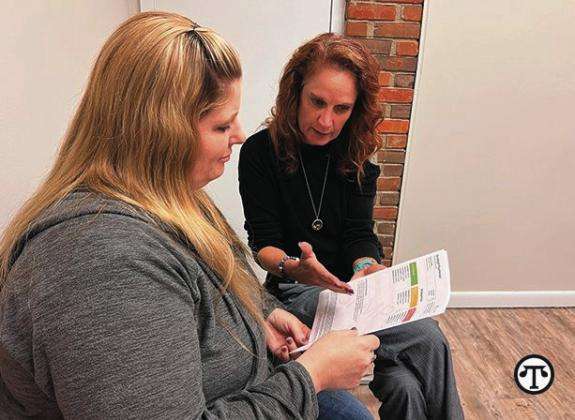FOR YOUR HEALTH: Many in primary care want patients to share mental health concerns
 Michele Long, CNP, reviews the results of the GeneSight test with her patient
Michele Long, CNP, reviews the results of the GeneSight test with her patient
(NAPSI)—Nurse practitioner Michele Long has been Beth’s primary care provider for years. So, when Beth started experiencing symptoms of depression, she scheduled an appointment with Michele.
It was the right decision. According to Beth, “Michele made me feel very comfortable talking to her about my mental health.”
Talking about mental health with primary care providers is something doctors and nurse practitioners want more people to do. According to the GeneSight Mental Health Monitor national survey from Myriad Genetics, more than 83 percent of primary care providers (PCPs) wish more of their patients would tell them about their mental health concerns.
Yet, more than half of surveyed clinicians don’t think patients are aware that PCPs and nurse practitioners are fully trained to diagnose and treat mental health conditions.
“It would be great if patients knew that they could bring up their mental health concerns to me,” said Long. “But it is also my responsibility to complete depression and anxiety screening with them.”
Regular mental health screenings at primary care appointments are a good first step in addressing patients’ mental health, bridging the communication gap, and accurately diagnosing those suffering with mental health conditions. However, diagnosis is just the beginning of what is often an uphill battle to find the appropriate medication and dosage to alleviate patients’ symptoms.
One tool that may help providers is the GeneSight test, which is a genetic test that determines how your genes may affect medication outcomes. Providers get a report about which medications to treat depression, anxiety, ADHD, and other mental health conditions may require dose adjustments, be less likely to work, or have an increased risk of side effects based on a patient’s DNA.
Long uses the GeneSight test to help reduce the medication trial-and-error process. After seeing that a prior depression medication didn’t work for Beth, Long ordered the GeneSight test and used the information to decide how to change Beth’s prescription. Today, Beth says she “feels so much better” and more like herself.
“Finding effective treatment can be a very frustrating process for patients. They often feel defeated when a medication doesn’t help them,” Long said. “GeneSight is a valuable tool that helps me find solutions for patients who have entrusted me with caring for their mental health.”
For more information about genetic testing and mental health, ask your clinician or visit genesight.com.
Responsible journalism is hard work!
It is also expensive!
If you enjoy reading The Town Line and the good news we bring you each week, would you consider a donation to help us continue the work we’re doing?
The Town Line is a 501(c)(3) nonprofit private foundation, and all donations are tax deductible under the Internal Revenue Service code.
To help, please visit our online donation page or mail a check payable to The Town Line, PO Box 89, South China, ME 04358. Your contribution is appreciated!


Leave a Reply
Want to join the discussion?Feel free to contribute!